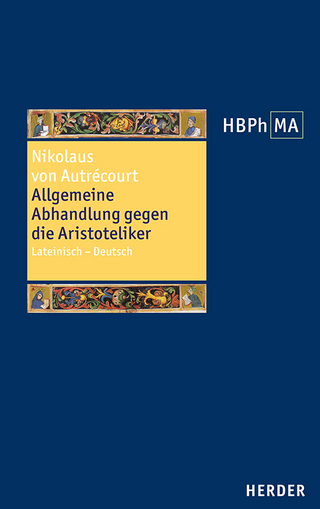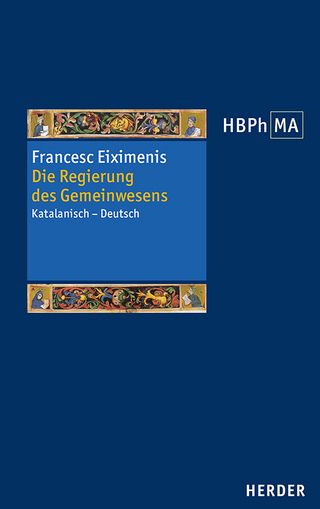
Aschkenas
In der deutsch-jüdischen Apokalypse
Seiten
2025
|
2025
Klostermann, Vittorio (Verlag)
978-3-465-04649-3 (ISBN)
Klostermann, Vittorio (Verlag)
978-3-465-04649-3 (ISBN)
- Noch nicht erschienen (ca. März 2025)
- Versandkostenfrei innerhalb Deutschlands
- Auch auf Rechnung
- Verfügbarkeit in der Filiale vor Ort prüfen
- Artikel merken
In seinem neuen Buch wendet sich Michael Chighel, der Leiter des Budapester Aschkenaziums, der inneren Dynamik der deutsch-jüdischen Geschichte des letzten halben Jahrtausends zu. Was er findet, ist eine „Theorie des Aschkenas“, die Betrachtung eines Judentums und eines Deutschtums, die sich in ihrer Begegnung wechselseitig beeinflusst haben. Die Schlüsselfigur dieser Begegnung ist Martin Luther, dessen Werk im Bösen wie im Guten wirkte. Ausgehend von Hermann Cohens wichtigem Essay "Deutschtum und Judentum" stößt Chighel in der Berührung all der Katastrophen, die das deutsch-jüdische Verhältnis im 20. Jahrhundert durchlebt hat, zu einem Verständnis der Aschkenasim vor, das dessen messianischen Charakter gerade für die Gegenwart betont. Sein kühner Versuch widmet sich damit einer Wiederaufnahme jenes Cohen’schen Projekts, die unmittelbar nach der Schoa nur als naiv hätte wahrgenommen werden können. Zudem ist er ein Beitrag zur Frage nach der geistigen Situation des Judentums heute, und damit auch zur Frage nach der geistigen Situation einer westlichen Zivilisation, deren christliche Wurzeln bis hinab in den Boden der hebräischen Bibel reichen.
In his new book, Michael Chighel, the director of the Budapest Ashkenazium, turns his attention to the inner dynamics of German-Jewish history over the last half millennium. What he finds is a ‘theory of Ashkenaz’, the observation of a Judaism and a Germanness that have mutually influenced each other in their encounter. The key figure in this encounter is Martin Luther, whose work had an effect in both good and evil ways. Based on Hermann Cohen's important essay "Deutschtum und Judentum" (Germanness and Judaism), Chighel advances to an understanding of the Ashkenazim that emphasises their messianic character, especially for the present, while touching on all the catastrophes that the German-Jewish relationship experienced in the 20th century. This bold attempt is thus dedicated to a resumption of Cohen's project, which could only have been perceived as naïve had it been undertaken immediately after the Shoah. It is also a contribution to the question of the spiritual situation of Judaism today, and thus also to the question of the spiritual situation of a Western civilisation whose Christian roots reach right down to the soil of the Hebrew Bible.
In his new book, Michael Chighel, the director of the Budapest Ashkenazium, turns his attention to the inner dynamics of German-Jewish history over the last half millennium. What he finds is a ‘theory of Ashkenaz’, the observation of a Judaism and a Germanness that have mutually influenced each other in their encounter. The key figure in this encounter is Martin Luther, whose work had an effect in both good and evil ways. Based on Hermann Cohen's important essay "Deutschtum und Judentum" (Germanness and Judaism), Chighel advances to an understanding of the Ashkenazim that emphasises their messianic character, especially for the present, while touching on all the catastrophes that the German-Jewish relationship experienced in the 20th century. This bold attempt is thus dedicated to a resumption of Cohen's project, which could only have been perceived as naïve had it been undertaken immediately after the Shoah. It is also a contribution to the question of the spiritual situation of Judaism today, and thus also to the question of the spiritual situation of a Western civilisation whose Christian roots reach right down to the soil of the Hebrew Bible.
Michael Chighel wuchs in Kanada auf und erlangte seinen PhD mit einer Dissertation über das Buch Hiob. Nach verschiedenen Lehraufträgen an kanadischen und europäischen Universitäten lehrt er seit 2020 am Budapester Aschkenazium, der Graduiertenschule für jüdische Studien in Budapest, dessen Leiter er ist.
| Erscheint lt. Verlag | 15.3.2025 |
|---|---|
| Reihe/Serie | Klostermann RoteReihe |
| Verlagsort | Frankfurt am Main |
| Sprache | deutsch |
| Maße | 123 x 200 mm |
| Themenwelt | Geisteswissenschaften ► Philosophie ► Philosophie des Mittelalters |
| Geisteswissenschaften ► Religion / Theologie | |
| Schlagworte | Aschkenasim • Cohen, Herman • Deutschtum • Ethik • Geschichte 1500–2000 • Judentum • Jüdische Religion • Kapitalismus • Luther, Martin • Philosophie • Reformation • Theologie |
| ISBN-10 | 3-465-04649-8 / 3465046498 |
| ISBN-13 | 978-3-465-04649-3 / 9783465046493 |
| Zustand | Neuware |
| Haben Sie eine Frage zum Produkt? |
Mehr entdecken
aus dem Bereich
aus dem Bereich
Lateinisch - Deutsch
Buch | Hardcover (2024)
Herder (Verlag)
70,00 €
Redewendungen aus der Natur
Buch | Hardcover (2024)
Regionalia Verlag
7,95 €


